人大附中2024-2025学年度高一年级第一学期英语期中练习卷 (扫描版,含答案)
文档属性
| 名称 | 人大附中2024-2025学年度高一年级第一学期英语期中练习卷 (扫描版,含答案) | 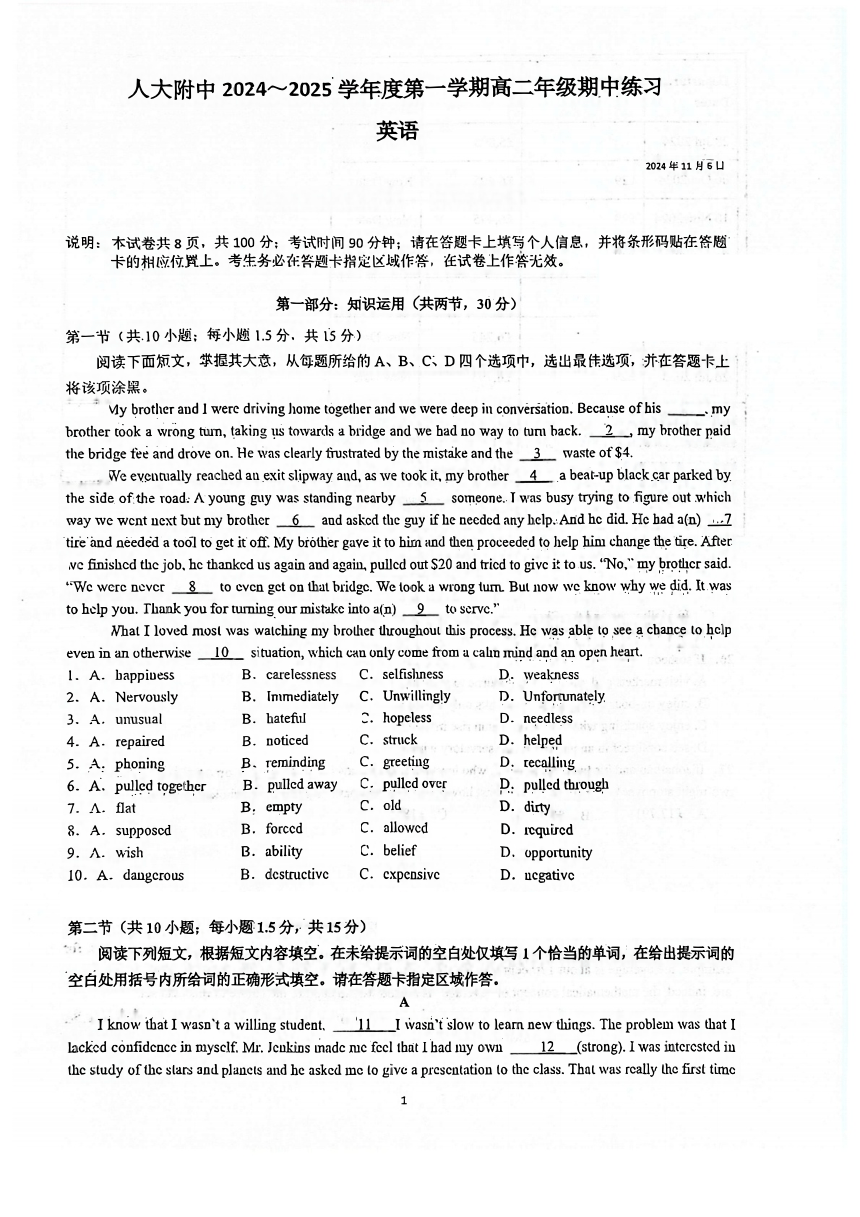 | |
| 格式 | |||
| 文件大小 | 5.3MB | ||
| 资源类型 | 教案 | ||
| 版本资源 | 人教版(2019) | ||
| 科目 | 英语 | ||
| 更新时间 | 2024-11-07 17:57:13 | ||
图片预览

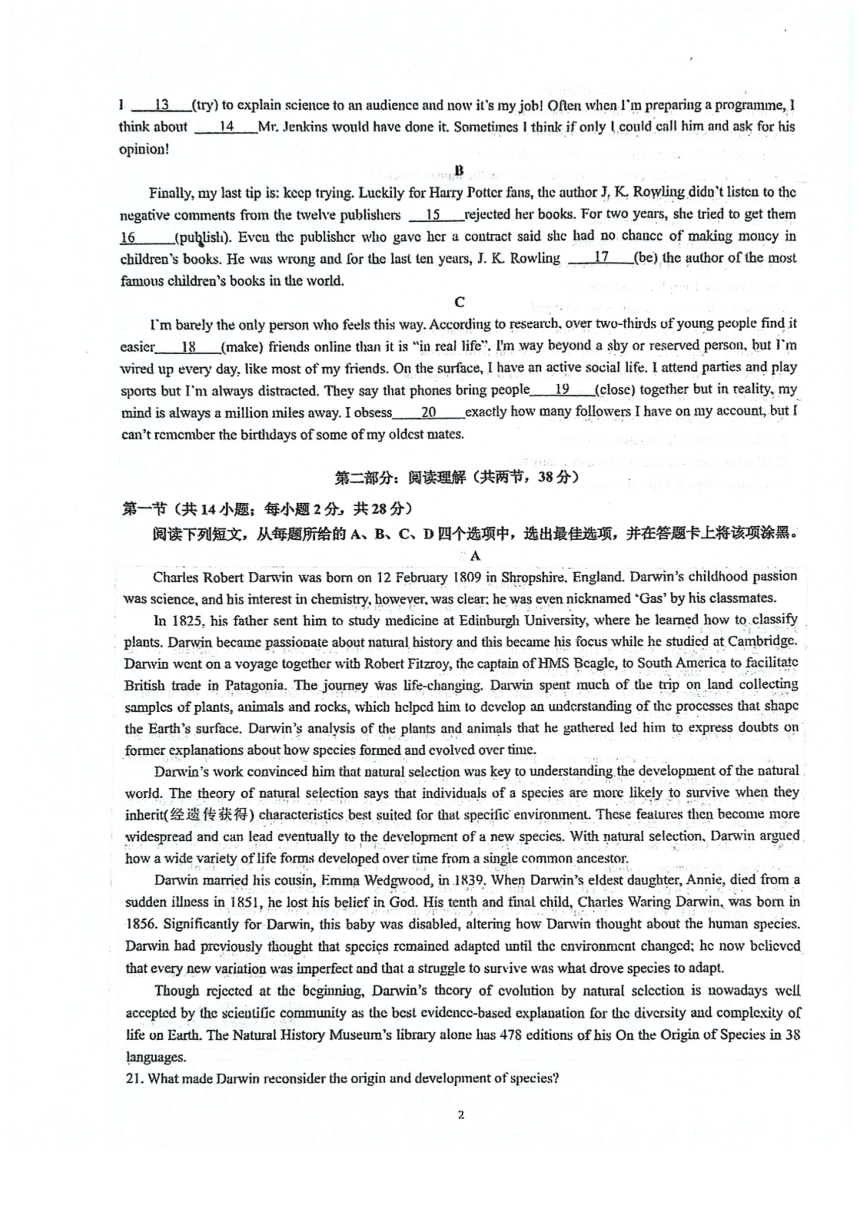
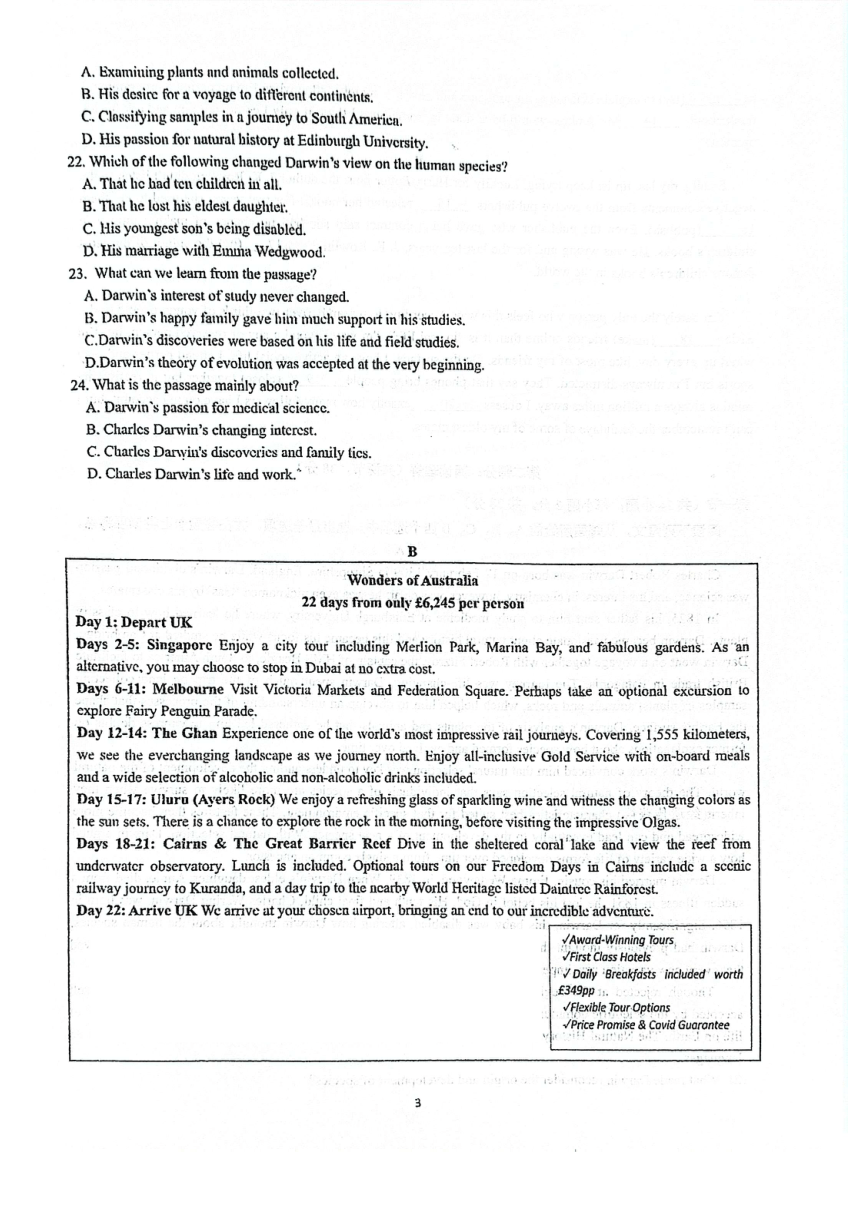
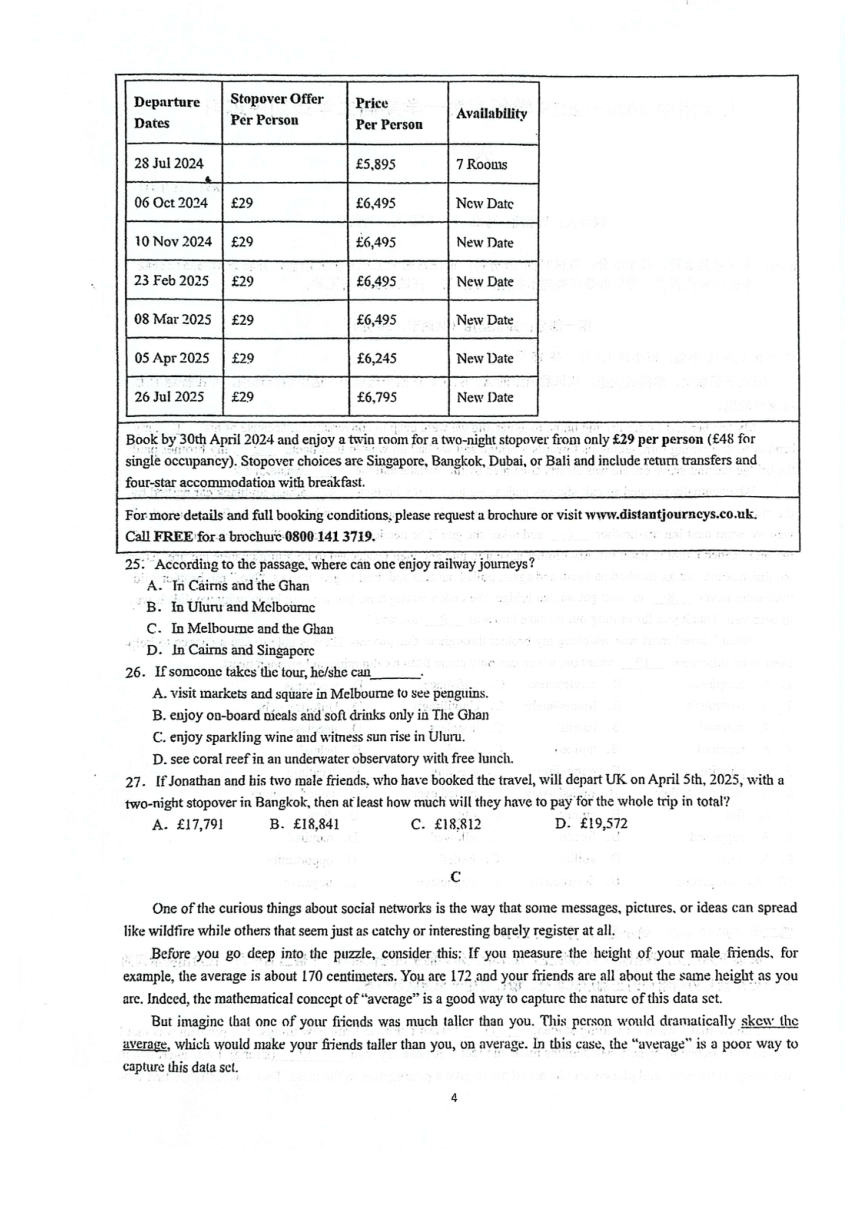
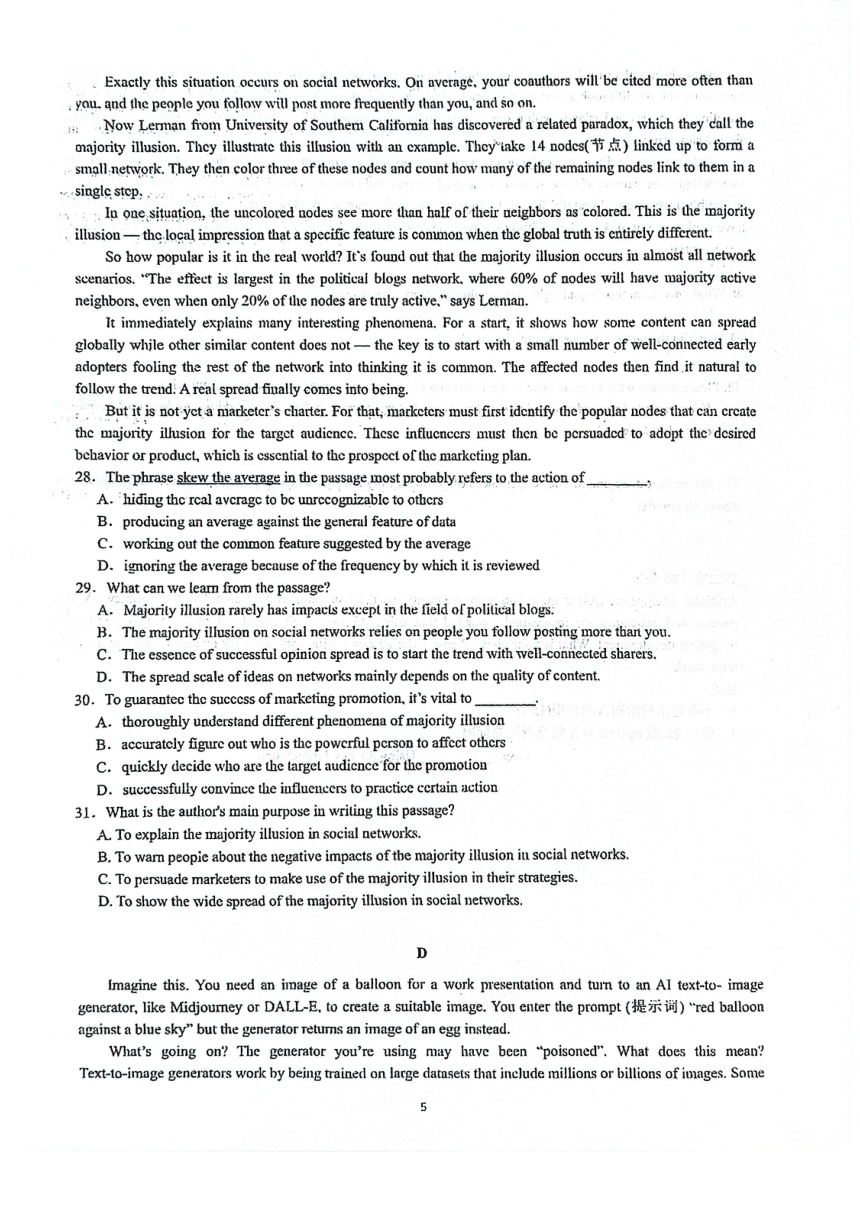
文档简介
人大附中2024~2025学年度第一学期高二年级期中练习
英语
2024年 11 月6U
说明: 本 试卷共8页 , 共 100 分; 考试时间 90分 钟; 请 在答题卡上填写个人信息, 并将条形码贴在答题
卡的相应位置上。 考 生务必在答题卡指定区域作答,在试卷上作答无效。
第一部分: 知识运用 (共两节, 30分)
第一节 (共 10小题; 每 小题 1.5分, 共 15 分 )
阅读下面短文, 掌握其大意, 从每题所给的A、 B、C、 D四个选项中,选出最佳选项, 并 在答题卡上
将 该项涂黑。
My brother and I were driving home together and we were deep in conversation. Because of his : my
brother took a wrong turn, taking us towarls a bridge and we bad no way to tun back. 2 _,my brother paid
the bridge tee and drove on.He was clearly frustrated by the mistake and the 3 waste of$4.
We evcnually reached an exit slipway and,as we took it, my brother 4 a beat-up blackcar parked by
the side of the road.A young guy was standing nearty 5 someone. I was busy trying to figure out which
way we went next but my brother 6 and asked the guy if he necded any help.And he did. He had a(n) z
tire and needed a tool to get it off.My brother gave it to hin and then proceeded to help him change the tire. After
we finished the job,hc thankcd us again and again,pulcd out S20 and tricd to give it to us.“No," my brothcr saidl .
“We were nevcr 8 to cven get on that bridgc. We took a wrong tun. But now we know why we did. It was
to help you. Thank you for turming our mistake into a(r) 9 to serve.”
What I loved most was walching my brolher throughou t this proces. He was able to see a chance to help
even in an otherwise 10 _ situation, which can only come from a caln mind and an open heart.
1. A. bappiness B. carelessness C. selfishness D. weakness
2. A. Nervously B. Immediately C. Unwilingly D. Unforunately
3. A. unusual B. hateful C. hopeless D. needless
4. A. repaired B. noticed C. struck D. helped
5. A. phoning B. reminding C.greeting D. recalling
6. A. pulled together B. pulled away C. pulled over D: pulted through
7. A. flat B. empty C. old D. dity
8. A. supposcd B. forccd C. allowed D. faquired
9. A. wish B. ability C. belief D. opportuniy
10. A. dangcrous B. destructive C. cxpensive D. ncgative
第二节 (共10小题; 每 小题1.5分 ,共15分)
阅读下列短文, 根据短文内容填空。 在未给提示词的空白处仅填写1个恰当的单词, 在给出提示词的
空白处用括号内所给词的正确形式填空。请在答题卡指定区域作答。
A
I know that I wasn't a wiling student. 11 I wasn't slow to learn new things. The problem was that I
lacked confidencc in mysclf. Mr. Jcnkins made me fec l that I had my own 12 (strong). I was interested in
the study of the slars and plancts and he asked me to give a prescntation to the class. That was really the first timc
1
参考答案
完形填空:BCDBA CAADD
语法填空
11. but
12. strengths
13. tried / had tried
14. how
15. who /that
16. published
17. has been
18. to make
19. closer
20. over/about)
阅读:
A 篇:ACCD
B 篇:ADB
C 篇:BCDA
D 篇:BAC
七选五:EDCFB
阅读表达
40.The author's initial goal was to secure a job immediately after graduation and contribute financially to the
family.
41.Due to financial and medical setbacks and facing rejections, the author reluctantly abandoned initial dreams.
On friends' advice, the author chose to study tourism to complete studies as quickly as possible.
42.When people laughed at me, I nearly lost hope, but my parents believed I was doing my best and asked me to
accept what I was.
When people laughed at me, I nearly lost hope, but my parents believed things would turn around and knew I was
doing my best.
43. 略
写作参考范文
For
In today's digital age, artificial intelligence (AI) is becoming an essential tool for students to complete their
homework. From my point of view, when used properly, AI offers significant advantages that enhance learning
experiences and outcomes.
Firstly, AI serves as an immediate source of information and feedback. When students encounter challenges
while completing assignments, they can access AI tools for quick explanations and resources. This instant support
empowers students to overcome obstacles, fostering resilience and a proactive attitude toward learning.
Moreover, the use of AI promotes the development of critical thinking skills. While interacting with AI, students
are often presented with various perspectives or solutions to a problem. They must analyze these options, weigh
their merits, and make informed decisions about which approach to adopt. This engagement with technology not
only sharpens their analytical abilities but also prepares them for future challenges in academics and beyond.
Admittedly, some concerns about the excessive use of AI are indeed valid. However, with proper guidance,
students can leverage AI to support their learning while developing the skills needed for future success. (179w)
Against
As artificial intelligence (AI) becomes increasingly integrated into education, many students are turning to it
for assistance with their homework. Despite the certain conveniences offered by AI, I’m still against the use of it
for homework.
To begin with, excessive reliance on AI can lead to a lack of thorough understanding of subjects. When
students depend on AI to provide answers and explanations, they may not engage deeply with the material. This
superficial engagement can result in gaps in knowledge, making it difficult for them to grasp essential concepts or
solve problems independently in the future.
Besides, using AI too often can hinder the development of critical thinking and problem-solving skills.
Homework is an opportunity for students to practice these abilities, but if they frequently turn to AI for help, they
may skip the process of analyzing and working through challenges on their own. This reliance can impede their
intellectual growth and limit their ability to think creatively and independently when faced with complex
problems later on.
In addition, the convenience of AI can create a false sense of security regarding academic performance.
Students might receive high grades on assignments due to AI assistance rather than their own understanding and
effort. This can lead to complacency, as they may not recognize the importance of mastering the material,
ultimately affecting their preparedness for future academic challenges and real-world situations.
In conclusion, while AI can offer certain benefits in education, its overuse for homework poses significant
risks to students' long-term development.
英语
2024年 11 月6U
说明: 本 试卷共8页 , 共 100 分; 考试时间 90分 钟; 请 在答题卡上填写个人信息, 并将条形码贴在答题
卡的相应位置上。 考 生务必在答题卡指定区域作答,在试卷上作答无效。
第一部分: 知识运用 (共两节, 30分)
第一节 (共 10小题; 每 小题 1.5分, 共 15 分 )
阅读下面短文, 掌握其大意, 从每题所给的A、 B、C、 D四个选项中,选出最佳选项, 并 在答题卡上
将 该项涂黑。
My brother and I were driving home together and we were deep in conversation. Because of his : my
brother took a wrong turn, taking us towarls a bridge and we bad no way to tun back. 2 _,my brother paid
the bridge tee and drove on.He was clearly frustrated by the mistake and the 3 waste of$4.
We evcnually reached an exit slipway and,as we took it, my brother 4 a beat-up blackcar parked by
the side of the road.A young guy was standing nearty 5 someone. I was busy trying to figure out which
way we went next but my brother 6 and asked the guy if he necded any help.And he did. He had a(n) z
tire and needed a tool to get it off.My brother gave it to hin and then proceeded to help him change the tire. After
we finished the job,hc thankcd us again and again,pulcd out S20 and tricd to give it to us.“No," my brothcr saidl .
“We were nevcr 8 to cven get on that bridgc. We took a wrong tun. But now we know why we did. It was
to help you. Thank you for turming our mistake into a(r) 9 to serve.”
What I loved most was walching my brolher throughou t this proces. He was able to see a chance to help
even in an otherwise 10 _ situation, which can only come from a caln mind and an open heart.
1. A. bappiness B. carelessness C. selfishness D. weakness
2. A. Nervously B. Immediately C. Unwilingly D. Unforunately
3. A. unusual B. hateful C. hopeless D. needless
4. A. repaired B. noticed C. struck D. helped
5. A. phoning B. reminding C.greeting D. recalling
6. A. pulled together B. pulled away C. pulled over D: pulted through
7. A. flat B. empty C. old D. dity
8. A. supposcd B. forccd C. allowed D. faquired
9. A. wish B. ability C. belief D. opportuniy
10. A. dangcrous B. destructive C. cxpensive D. ncgative
第二节 (共10小题; 每 小题1.5分 ,共15分)
阅读下列短文, 根据短文内容填空。 在未给提示词的空白处仅填写1个恰当的单词, 在给出提示词的
空白处用括号内所给词的正确形式填空。请在答题卡指定区域作答。
A
I know that I wasn't a wiling student. 11 I wasn't slow to learn new things. The problem was that I
lacked confidencc in mysclf. Mr. Jcnkins made me fec l that I had my own 12 (strong). I was interested in
the study of the slars and plancts and he asked me to give a prescntation to the class. That was really the first timc
1
参考答案
完形填空:BCDBA CAADD
语法填空
11. but
12. strengths
13. tried / had tried
14. how
15. who /that
16. published
17. has been
18. to make
19. closer
20. over/about)
阅读:
A 篇:ACCD
B 篇:ADB
C 篇:BCDA
D 篇:BAC
七选五:EDCFB
阅读表达
40.The author's initial goal was to secure a job immediately after graduation and contribute financially to the
family.
41.Due to financial and medical setbacks and facing rejections, the author reluctantly abandoned initial dreams.
On friends' advice, the author chose to study tourism to complete studies as quickly as possible.
42.When people laughed at me, I nearly lost hope, but my parents believed I was doing my best and asked me to
accept what I was.
When people laughed at me, I nearly lost hope, but my parents believed things would turn around and knew I was
doing my best.
43. 略
写作参考范文
For
In today's digital age, artificial intelligence (AI) is becoming an essential tool for students to complete their
homework. From my point of view, when used properly, AI offers significant advantages that enhance learning
experiences and outcomes.
Firstly, AI serves as an immediate source of information and feedback. When students encounter challenges
while completing assignments, they can access AI tools for quick explanations and resources. This instant support
empowers students to overcome obstacles, fostering resilience and a proactive attitude toward learning.
Moreover, the use of AI promotes the development of critical thinking skills. While interacting with AI, students
are often presented with various perspectives or solutions to a problem. They must analyze these options, weigh
their merits, and make informed decisions about which approach to adopt. This engagement with technology not
only sharpens their analytical abilities but also prepares them for future challenges in academics and beyond.
Admittedly, some concerns about the excessive use of AI are indeed valid. However, with proper guidance,
students can leverage AI to support their learning while developing the skills needed for future success. (179w)
Against
As artificial intelligence (AI) becomes increasingly integrated into education, many students are turning to it
for assistance with their homework. Despite the certain conveniences offered by AI, I’m still against the use of it
for homework.
To begin with, excessive reliance on AI can lead to a lack of thorough understanding of subjects. When
students depend on AI to provide answers and explanations, they may not engage deeply with the material. This
superficial engagement can result in gaps in knowledge, making it difficult for them to grasp essential concepts or
solve problems independently in the future.
Besides, using AI too often can hinder the development of critical thinking and problem-solving skills.
Homework is an opportunity for students to practice these abilities, but if they frequently turn to AI for help, they
may skip the process of analyzing and working through challenges on their own. This reliance can impede their
intellectual growth and limit their ability to think creatively and independently when faced with complex
problems later on.
In addition, the convenience of AI can create a false sense of security regarding academic performance.
Students might receive high grades on assignments due to AI assistance rather than their own understanding and
effort. This can lead to complacency, as they may not recognize the importance of mastering the material,
ultimately affecting their preparedness for future academic challenges and real-world situations.
In conclusion, while AI can offer certain benefits in education, its overuse for homework poses significant
risks to students' long-term development.
同课章节目录
